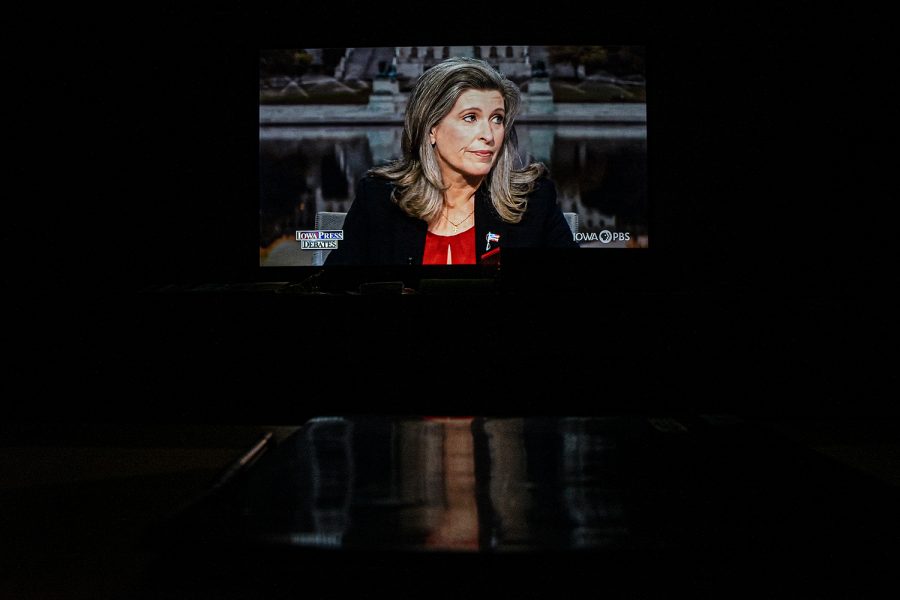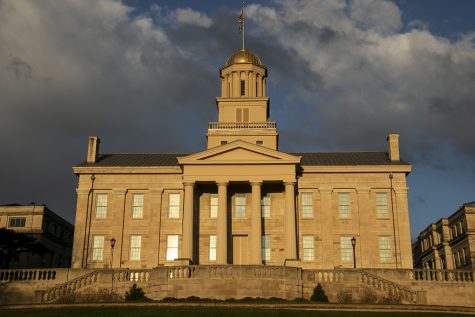Opinion | Facebook’s QAnon ban and free speech
QAnon is a rampantly growing conspiracy theory that has led to harm across the country — and Facebook’s role in spreading it was tantamount to aiding and abetting.
U.S. Sen. Joni Ernst, R-Iowa debates Democratic U.S. Senate candidate Theresa Greenfield on PBS Iowa on Monday, September 28th, 2020.
October 7, 2020
One of the U.S.’s greatest features of the modern era are its conspiracy theories: MKUltra, Pizzagate, and now QAnon. Facebook recently banned QAnon groups off of its platform, but the damage has already been done. Facebook’s negligence in policing its platform has caused irreparable damage to public perceptions and beliefs — including the beliefs of elected officials.
QAnon is a far-right conspiracy theory which purports that the “deep-state” is waging a war against President Trump, democrats like Nancy Pelosi and Hillary Clinton eat the brains of children, and other absurd claims.
Believers in the conspiracy theory have been linked to numerous crimes: the vigilante killing of a mob-boss, a man murdering his brother because he thought he was a “lizard,” kidnappings, and assaults.
But why does this absurd conspiracy theory matter? It’s clearly a bunch of lunatics that are unwell and getting caught up in some fringe ideas.
But that’s because these aren’t just random people — it’s elected officials in the highest offices of the U.S.
A recent resolution passed in the House of Representatives to condemn the conspiracy theory, however 17 voted against it.
It also hits closer to home as well. Sen. Joni Ernst, R-Iowa, purported (and has since apologized for doing so) the myth that hospitals inflated the COVID-19 death numbers were inflated — a claim that QAnon believers also push.
So, with all that context aside, now there’s the recent move from Facebook to ban QAnon groups off its platform. But it’s too little, too late.
The Facebook press release on Tuesday announced that the social media giant would delete all QAnon-associated groups from the platform — this comes after it already banned a massive Qanon group back in August, and cracked down on more groups in the following weeks.
While Facebook should be given credit for finally shutting down these demonstrably dangerous groups, it should in no way shape or form be forgiven in helping to push this conspiracy theory in the first place.
An anonymous Facebook executive commented to POLITICO that “right-wing populism is always more engaging.” It’s not that Facebook pushes these types of things, it’s simply that it’s so viscerally evocative that it sucks people in. The executive even goes so far as to say that “it was there in the 1930s. It wasn’t invented by social media.”
Equating what goes on inside of your platform to the time of the rise of the Nazis isn’t exactly a good look.
It may very well be that the algorithm doesn’t favor conservatives explicitly, but when the algorithm works off of engagement, and a blatantly false, domestic terrorist threat is incredibly engaging, there’s an issue.
There isn’t much we as individuals can do to combat the spread of this on a nationwide scale. We as individuals cannot make a conspiracy vanish into the aether when the president says believers in it “love our country.”
But what we can do is push back on narratives that we hear from friends and from family. QAnon believers can be anywhere, and they can get sucked in by these false stories.
Even if they reject what you’re saying, at least confronting them on the issue can stop a part of the indoctrination it takes to fully fall into this rabbit hole.
Columns reflect the opinions of the authors and are not necessarily those of the Editorial Board, The Daily Iowan, or other organizations in which the author may be involved.
















